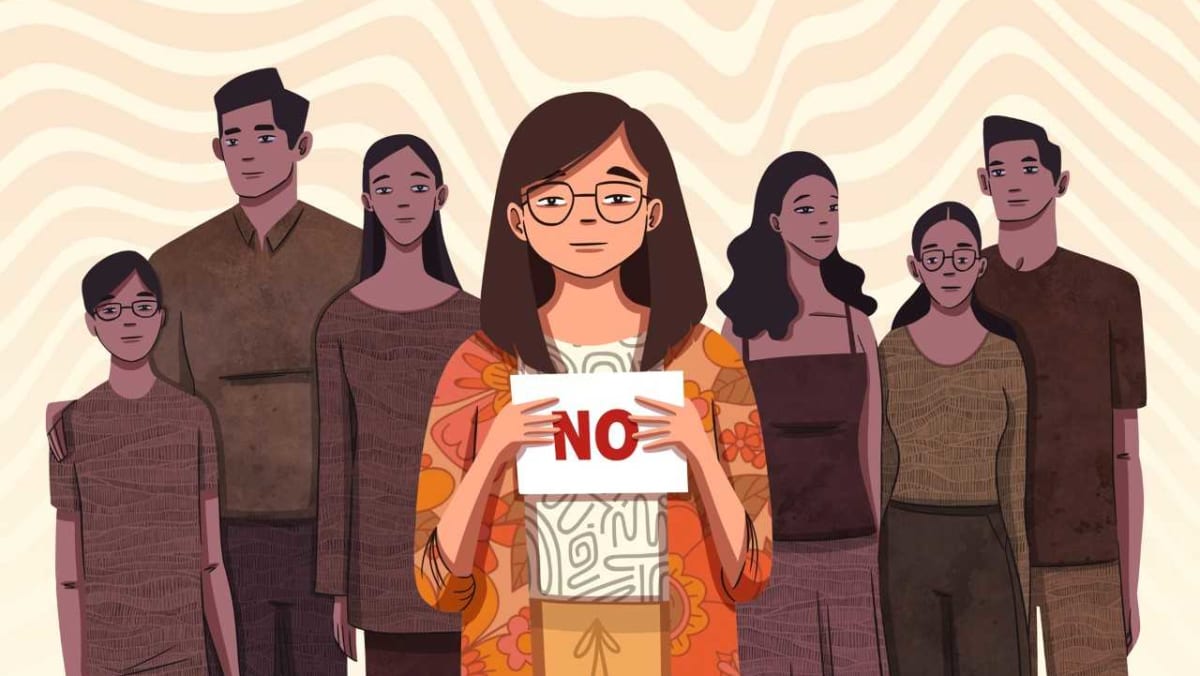
 By
By
Tessa Oh
I also struggle at times with what to say because I don’t always feel like I have a good answer for topics in which I have no experience.
Even then, until recently, I have found it difficult to say “no” when friends or family members come to me looking for a listening ear.
I felt guilty for turning them away, believing that doing so would make me a bad friend, daughter or sister.
As a result, I have found myself feeling resentful and annoyed sometimes when I’m asked to help to weigh in on a problem or play the mediator between parties.
This has led to me snapping at them on occasion, moments that I don’t feel proud of looking back.
To help me overcome this issue, I sought advice from my therapist who gave me strategies and tips on how to better communicate my boundaries with my loved ones.
Though it’s not always easy, I’m learning to say “no” to them and direct them to other channels of support when I feel I cannot manage.
WHY SETTING BOUNDARIES CAN HELP
To write this column, I spoke to counsellors and therapists to understand why setting boundaries with friends and family is important, and sought advice on how one can do so without feeling like they’ve offended their loved ones or let them down.
While I struggle with setting emotional boundaries, Ms Miranda Ledesma, a trauma counsellor and psychotherapist at Soulmosaic Therapy, noted that knowing one’s physical boundaries are important as well.
She added that drawing these lines are important because it signals mutual respect between you and the other party.
“When you’re setting healthy boundaries, what you’re saying is that you respect yourself and you also expect that (respect) from other people,” Ms Ledesma said.
“If the lines are blurred between yourself and another person, that’s what makes it difficult to recognise your own needs, wishes and desires.”
Ms Theresa Pong, counselling director at The Relationship Room, said that boundaries are not only useful to protect your own needs, they are also necessary to protect your relationship with others.
“If you don’t keep the boundary and are afraid that you are going to ruin your relationships (by imposing one), you will make things worse because what happens is that when your boundary is being pushed, slowly you will start to have resentment,” she said.
For example, the situation could be as simple as letting a friend know you cannot meet them at a particular time because you have blocked the period off as personal time for yourself to unwind and relieve stress.
If you accept an invitation to meet a friend during this window and fail to tell them that they are infringing this protected time, you are not giving the person an opportunity to signal whether they are okay with the lines being drawn, Ms Pong said.
“The other party may be more than happy to say, ‘Hey, we can catch up on another day’, or find a date and time that both of you are comfortable with,” she said.
HOW TO KNOW YOUR BOUNDARIES ARE BEING CROSSED
Ms Ledesma said that being in touch with your feelings and identifying why you are feeling uncomfortable with someone can be a sign that there is something deeper needing to be addressed.
Being able to name what you’re feeling can also help you to decide how you may want to deal with the situation.
“Because if you’re feeling anger, you’re going to deal with that differently from if you’re feeling frustrated or overwhelmed,” she said.
“Emotions are signals. So, anger is often a signal that your boundaries are being violated,” she added.
HOW TO GO ABOUT SETTING BOUNDARIES
Ms Pong said that the two key ingredients to drawing boundaries are: Being assertive and practising active listening.
Being assertive would require you to know what are your boundaries and be firm with the other person on what those needs are.
To actively listen is to listen out for what the other party’s desires and wants are.
“Don’t really focus on the content (of what they are saying), but focus on the emotions,” she said, adding that understanding the other party will make the process of setting boundaries easier.
Ms Pong also suggested starting sentences with “I” rather than “you” so that you are informing the other party about your emotions rather than telling them what you do or don’t want them to do.
“Instead of telling them, ‘No, you cannot come and meet me’, which sounds very offensive, you can say ‘I appreciate you, I hear that you want to come down… but at this point I’m feeling tired’.”
Lastly, offer an alternative solution to see if a compromise can be struck.
The counsellors also pointed out that boundaries are flexible, and one can gradually work towards introducing a boundary to a friend or family member who may not be immediately receptive or understand why lines are being drawn in the first place.
Ms Pong cited the example of older parents who may be experiencing “empty nest syndrome” and get upset when their single adult children inform them of their decision to buy a Housing and Development Board flat and move out when they turn 35.
In this scenario, she said that you can start early by introducing the idea to them before you turn 35 and reassure them along the way that you will continue to care for them and visit them even after you leave the nest.
“With parents, sometimes you have to go slow. Boundaries are not borders where you’re building up a wall. They are open, so we can slowly work towards where your boundary is.”
MEET OWN NEEDS FIRST BEFORE HELPING OTHERS
Personally, I learnt about the power of setting boundaries through role-playing with my therapist.
This came up during a time when I was struggling with saying “no” to family members who often wanted me to play mediator when there were conflicts at home.
I was adamant that setting these hard lines would be impossible because my family would take it personally or push back against the boundaries I set, making matters worse.
Then, when the therapist performed that mock conversation with me, I saw how simple it could be to be firm while respectful when indicating what my hard lines are.
And when I started to put these skills into practice, I saw how saying “no” helped improve my relationships with my loved ones because I no longer held onto the resentment of carrying everyone’s emotional burdens.
For other “agony aunts” like myself, one helpful piece of advice the counsellors gave was to remember that you cannot help others when your own needs are not being met.
Ms Ledesma also pointed out that by being everyone’s emotional crutch, you may be doing a disservice to your friends and family because they will not learn how to tackle their problems on their own.
“It’s really hard for us to watch (our loved ones) in difficult times because we want to help them. We don’t want to see somebody else get hurt. But if we frequently save somebody else from their own issues, we don’t give them an opportunity to manage on their own,” she said.
ABOUT THE AUTHOR:
Tessa Oh is a journalist at TODAY, where she covers health, manpower and the environment.